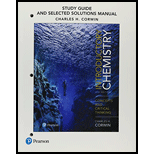
Concept explainers
(a)
Interpretation:
The mass/mass percentage of
Concept introduction:
The percentage composition of a compound is calculated by comparing the mass contributed by each element to the molar mass of the substance. The sum of the percentage composition of each element is equal to the percentage composition of the compound.
Answer to Problem 43E
The mass percentage of
Explanation of Solution
The mass percentage is calculated by the formula as shown below.
The value of the mass of
Substitute the value of mass of
Therefore, the mass percentage of
The mass percentage of
(b)
Interpretation:
The mass percentage of
Concept introduction:
The percentage composition of a compound is calculated by comparing the mass contributed by each element to the molar mass of the substance. The sum of the percentage composition of each element is equal to the percentage composition of the compound.
Answer to Problem 43E
The mass percentage of
Explanation of Solution
The mass percentage is calculated by the formula as shown below.
The value of mass of
Substitute the value of mass of
Therefore, the mass percentage of
The mass percentage of
(c)
Interpretation:
The mass percentage of
Concept introduction:
The percentage composition of a compound is calculated by comparing the mass contributed by each element to the molar mass of the substance. The sum of the percentage composition of each element is equal to the percentage composition of the compound.
Answer to Problem 43E
The mass percentage of
Explanation of Solution
The mass percentage is calculated by the formula as shown below.
The value of mass of
Substitute the value of mass of
Therefore, the mass percentage of
The mass percentage of
(d)
Interpretation:
The mass percentage of
Concept introduction:
The percentage composition of a compound is calculated by comparing the mass contributed by each element to the molar mass of the substance. The sum of the percentage composition of each element is equal to the percentage composition of the compound.
Answer to Problem 43E
The mass percentage of
Explanation of Solution
The mass percentage is calculated by the formula as shown below.
The value of mass of
Substitute the value of mass of
The mass percentage of
The mass percentage of
Want to see more full solutions like this?
Chapter 13 Solutions
INTRODUCTORY CHEMISTRY-STD.GDE.+SOL.MAN
 ChemistryChemistryISBN:9781305957404Author:Steven S. Zumdahl, Susan A. Zumdahl, Donald J. DeCostePublisher:Cengage Learning
ChemistryChemistryISBN:9781305957404Author:Steven S. Zumdahl, Susan A. Zumdahl, Donald J. DeCostePublisher:Cengage Learning ChemistryChemistryISBN:9781259911156Author:Raymond Chang Dr., Jason Overby ProfessorPublisher:McGraw-Hill Education
ChemistryChemistryISBN:9781259911156Author:Raymond Chang Dr., Jason Overby ProfessorPublisher:McGraw-Hill Education Principles of Instrumental AnalysisChemistryISBN:9781305577213Author:Douglas A. Skoog, F. James Holler, Stanley R. CrouchPublisher:Cengage Learning
Principles of Instrumental AnalysisChemistryISBN:9781305577213Author:Douglas A. Skoog, F. James Holler, Stanley R. CrouchPublisher:Cengage Learning Organic ChemistryChemistryISBN:9780078021558Author:Janice Gorzynski Smith Dr.Publisher:McGraw-Hill Education
Organic ChemistryChemistryISBN:9780078021558Author:Janice Gorzynski Smith Dr.Publisher:McGraw-Hill Education Chemistry: Principles and ReactionsChemistryISBN:9781305079373Author:William L. Masterton, Cecile N. HurleyPublisher:Cengage Learning
Chemistry: Principles and ReactionsChemistryISBN:9781305079373Author:William L. Masterton, Cecile N. HurleyPublisher:Cengage Learning Elementary Principles of Chemical Processes, Bind...ChemistryISBN:9781118431221Author:Richard M. Felder, Ronald W. Rousseau, Lisa G. BullardPublisher:WILEY
Elementary Principles of Chemical Processes, Bind...ChemistryISBN:9781118431221Author:Richard M. Felder, Ronald W. Rousseau, Lisa G. BullardPublisher:WILEY





